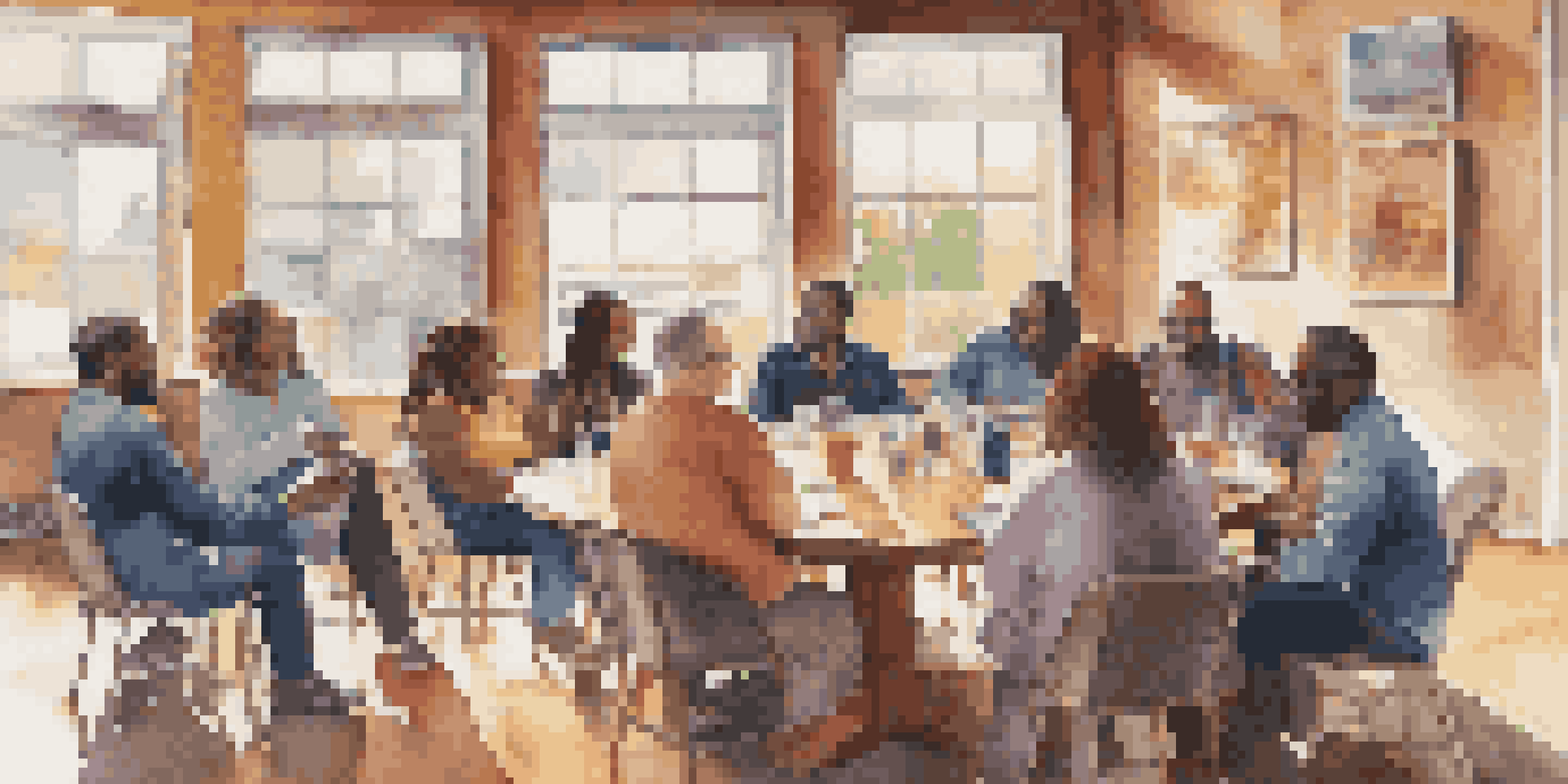Addressing the Disconnect Between Music Policy and Practice

Understanding the Role of Music Policy in Society
Music policy serves as a guiding framework for how music is created, performed, and consumed. It often reflects cultural values and aims to support artists while also considering community needs. By establishing clear guidelines, music policy can foster an environment where creativity thrives.
Music can change the world because it can change people.
However, many find that policies can be vague or overly complex, leading to misunderstandings about their practical applications. For instance, a policy promoting local artists might not effectively address the barriers they face in gaining exposure. This dissonance can stifle innovation and hinder community engagement with the arts.
Ultimately, effective music policy should resonate not just on paper but in practice, creating a synergy between the two realms. This is where the challenge lies: translating lofty ideals into tangible actions that benefit artists and audiences alike.
Identifying the Disconnect Between Policy and Practice
One primary disconnect occurs when policymakers don’t consult with musicians and industry professionals during the drafting of music policies. This oversight can result in unrealistic expectations and a lack of applicable strategies. For example, a policy requiring venues to host a certain number of local acts might be impractical if those acts don't have the necessary promotional support.

Another issue is the lack of awareness among musicians about existing policies that could benefit them. Many artists are unaware of grant opportunities or support programs, which leads to missed chances for growth and exposure. This gap highlights a crucial need for better communication and outreach.
Engage Stakeholders for Better Policies
Involving musicians, venue owners, and community leaders in the policymaking process can lead to more effective and relevant music policies.
To bridge this divide, it’s essential to foster ongoing dialogue between policymakers and the music community. By creating platforms for discussion, both sides can share insights and develop policies that are not only aspirational but actionable.
The Importance of Stakeholder Engagement
Engaging a diverse range of stakeholders is vital for creating effective music policies. This includes musicians, venue owners, educators, and community leaders, all of whom bring unique perspectives to the table. By involving these stakeholders, policymakers can gain valuable insights into the real-world implications of their decisions.
Without music, life would be a mistake.
For instance, a roundtable discussion including local artists and venue representatives can illuminate the challenges each faces, leading to more nuanced policies. When stakeholders feel heard and valued, they are more likely to support and collaborate on implementing those policies.
Moreover, ongoing engagement fosters a sense of community ownership over music policies, reinforcing their relevance. When people see their input reflected in policy, they're more likely to participate actively in the cultural landscape.
Education and Awareness: Key to Implementation
Education plays a crucial role in ensuring that both policymakers and musicians understand the nuances of music policy. Workshops, webinars, and informational resources can help demystify complex regulations and promote best practices. By raising awareness, musicians can better navigate the landscape and leverage available support.
For example, a local arts organization might host a workshop explaining grant applications, copyright laws, and performance rights. Such initiatives empower artists with the knowledge they need to succeed while also aligning their practices with existing policies.
Education Bridges Policy Gaps
Raising awareness and providing educational resources empowers musicians to navigate complex policies and leverage available support.
Furthermore, educating the public about the importance of music policy can create broader support for the arts. When communities understand how policies affect local culture, they are more likely to advocate for initiatives that promote music and the arts.
Evaluating Existing Policies: What Works and What Doesn't
Regular evaluation of music policies is essential to determine their effectiveness. By examining outcomes, policymakers can identify which initiatives are successful and which need revision. This could involve collecting data on artist engagement, audience attendance, and economic impact.
For instance, a city might analyze the performance of grants given to local musicians and assess how these led to increased visibility or revenue. Such evaluations provide concrete evidence that informs future policy decisions, ensuring they remain relevant and beneficial.
Moreover, feedback from the music community can guide these evaluations. By encouraging artists to share their experiences, policymakers can gain insights into the practical implications of their regulations and make necessary adjustments.
Creating a Collaborative Framework for Future Policies
Developing a collaborative framework is essential for crafting music policies that resonate with real-world practices. This framework should prioritize transparency and inclusivity, ensuring all voices are heard throughout the policymaking process. Collaboration can lead to innovative solutions tailored to the unique needs of each community.
For example, creating a task force that includes musicians, industry experts, and community representatives can facilitate ongoing dialogue and brainstorming. This collaborative approach helps to identify challenges and opportunities, making it easier to draft policies that reflect the collective vision.
Evaluate Policies for Continuous Improvement
Regular evaluation of music policies helps identify successful initiatives and areas needing revision to better serve the music community.
Additionally, a collaborative framework encourages accountability. When stakeholders work together, they share the responsibility for implementing and upholding policies, fostering a sense of community and shared purpose.
Conclusion: Moving Toward a Harmonious Future
Addressing the disconnect between music policy and practice is crucial for fostering a vibrant music ecosystem. By engaging stakeholders, enhancing education, and evaluating current strategies, we can create policies that truly support musicians and communities alike. The goal is to ensure that what is written in policy aligns seamlessly with the lived experiences of artists and audiences.
As we move forward, it is essential to maintain open lines of communication between all parties involved. A collaborative and proactive approach can lead to a more harmonious relationship between policy and practice, ultimately enriching the cultural fabric of our communities.

In this way, we can create an environment where music thrives, artists are empowered, and audiences are engaged. It’s time to bridge the gap and make music policies work for everyone.